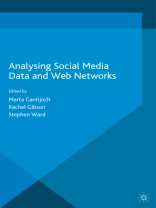As governments, citizens and organizations have moved online there is an increasing need for academic enquiry to adapt to this new context for communication and political action. This adaptation is crucially dependent on researchers being equipped with the necessary methodological tools to extract, analyze and visualize patterns of web activity. This volume profiles the latest techniques being employed by social scientists to collect and interpret data from some of the most popular social media applications, the political parties’ own online activist spaces, and the wider system of hyperlinks that structure the inter-connections between these sites. Including contributions from a range of academic disciplines including Political Science, Media and Communication Studies, Economics, and Computer Science, this study showcases a new methodological approach that has been expressly designed to capture and analyze web data in the process of investigating substantive questions.
Table of Content
Introduction: The Importance of Method in the Study of the Political Internet’; Marta Cantijoch, Rachel Gibson, Laura Sudulich, Matthew Wall and Stephen Ward PART I: STRUCTURE AND INFLUENCE 1. Political Homophily on the Web; Robert Ackland and Jamsheed Shorish 2. Blogosphere Authority Index 2.0: Change and Continuity in the American Political Blogosphere, 2007-2010; Dave Karpf 3. A Tool for Analysing Youtube Audience Reactions and Discussions; Mike Thelwall PART II: CONTENTS AND INTERACTIONS 4. Social Data Analytics Tool: A Demonstrative Case Study of Methodology and Software; Ravi Vatrapu, Abid Hussain, Daniel Hardt, and Zeshan Jaffari 5. Opportunities and Challenges of Analysing Twitter Content. A Comparison of the Occupation Movements in Spain, Greece and the US; Gema Garcia-Albacete and Yannis Theocharis 6. Stuttgart’s Black Thursday on Twitter: Mapping Political Protests with Social Media Data; Andreas Jungherr and Pascal Jurgens 7. Analysing ‘Super-participation’ in Online Third Spaces; Todd Graham and Scott Wright PART III: MIXED METHODS AND APPROACHES FOR ANALYSIS OF WEB CAMPAIGNS 8. A Mixed-Methods Approach to Capturing Online Local-Level Data; Rosalynd Southern. 9. From Web Sites to Web Presences. Interactive Behaviours in Web Campaigns During the 2010 UK General Election; Benjamin Lee New Directions in Web Analysis: Semantic Polling and the Future of Opinion Surveys; Nick Anstead and Ben O’Loughlin
About the author
Robert Ackland, Australian National University, Austrailia Nick Anstead, London School of Economics, UK Gema M. García-Albacete, Universidad Autónoma de Madrid, Spain Todd Graham, University of Groningen, Netherlands Daniel Hardt, Copenhagen Business School, Denmark Abid Hussain, Copenhagen Business School, Denmark Zeshan Ali Jaffari, Copenhagen Business School, Denmark Andreas Jungherr, Otto-Friedrich-Universität, Bamberg, Germany Pascal Jürgens, Johannes Gutenberg-Universität, Mainz, Germany David Karpf, George Washington University, USA Benjamin Lee, University of Leicester, UK Ben O’Loughlin, Royal Holloway, University of London, UK Jamsheed Shorish, Uberlink Corporation and Shorish Research, Belgium Rosalynd Southern, University of Manchester, UK Laura Sudulich, Université Libre de Bruxelles, Belgium Mike Thelwall, University of Wolverhampton, UK Yannis Theocharis, University of Mannheim, Germany Ravi Vatrapu, Copenhagen Business School, Denmark and Norwegian School of Information Technology, Norway Matt Wall, Swansea University, UK Scott Wright, University of Melbourne, Australia












